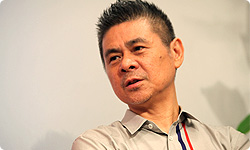5. Context Makes All the Difference
Everything we’ve talked about so far is connected, about ideas solving multiple issues at once, problem awareness, finding solutions, and grasping what’s wrong with an idea.
That’s right. So to return to that most difficult of questions - How do you come up with your ideas? - I’d say that if my drawer of ideas isn’t in order and I don’t have the right awareness of the objective driving me to find a solution, then I can’t come up with ideas.
Right. And you also can’t if both aren’t continuous.
So coming up with something the day before deadline is, in a way, all right. That’s because, under the immediate pressure of having to resolve the issue, you’re seriously checking the contents of your drawer of ideas.
That’s right. But it isn’t right to just keep relentlessly dragging it out. We do actually drag things out and relentlessly beat our head against them, but our persistence isn’t what gets results all the time.
No, not at all.
Have you ever explained that to the staff? I mean, young people want to prove to you, and themselves, with how hard they work. They look up at you and say, “It must be good because I worked so hard on it,” and “How many more days should I work on it?”
Ah, that happens all the time. They say, “I’ll work hard at it,” but I say, “This isn’t about how hard you work.” (laughs) I’m not just being harsh. It’s really not just about working hard.
I know just what you mean! (laughs)
If possible, I’d like to get results in an easy way.
Right. Me too.
Basically, that’s true. Everyone thinks about whether there might be some easier way of doing things. But these days it’s like lots of people just make more work.
The more work you make, the less visible things become. It ends up with you saying “It took me months to make this checklist!”
Yeah. It takes time to face and think about something. So I often think it’s better to think more simply.
It has something to do with our main topic today. You can’t just say, “It’s not about how hard you work.” I think we should add two or three more things to that.

Oh. Right. We should explain what we mean.
You know, the two of us. With me helping.
(laughs)
I mean, if someone’s working hard and someone else tells them that working hard isn’t what’s important, they’ll be confused about what they should do. But I’m sure you and I say that to people.
Um, and sometimes they say, “But you told me something different before, didn’t you?”
Yeah, yeah, yeah! (laughs)
That’s difficult to explain, too. For example, when the goal is different, your view of the same thing might be considerably different.
Absolutely. Context makes all the difference.
Yes, all the difference in the world. For example, when a project is floundering, and an idea put forth is half-and-half - 50 percent good and 50 percent bad - it’s no good. But when a project is moving along smoothly, even if 60 percent of the idea is bad, as long as there are some good aspects, you can use it.
Uh-huh.
In a case like that, when they come to me with the same thing and say, “It was no good before, but this time it’s okay?” and I say, “Yeah, that’s fine,” they just stand there gawping. (laughs)
Yep. (laughs)
When the situation is different, the momentum changes. But the person who is always concerned about how much effort they put in always maintains the same temperature, so to speak.
Yeah.
It’s good to work hard, but…
Hmm…we need to do better. (in explaining what they mean)
Mmm. (laughs)
